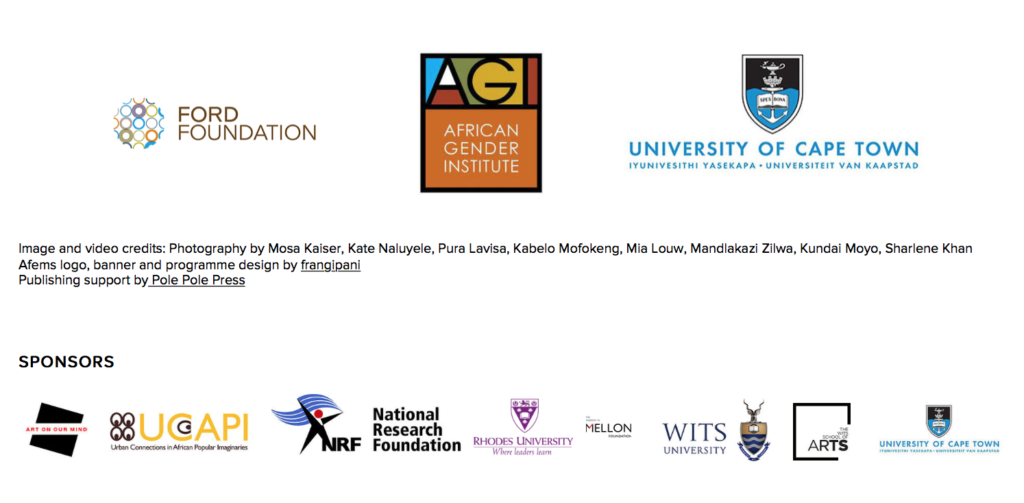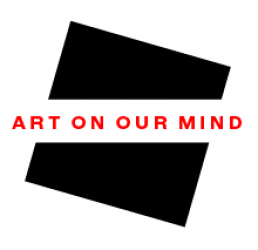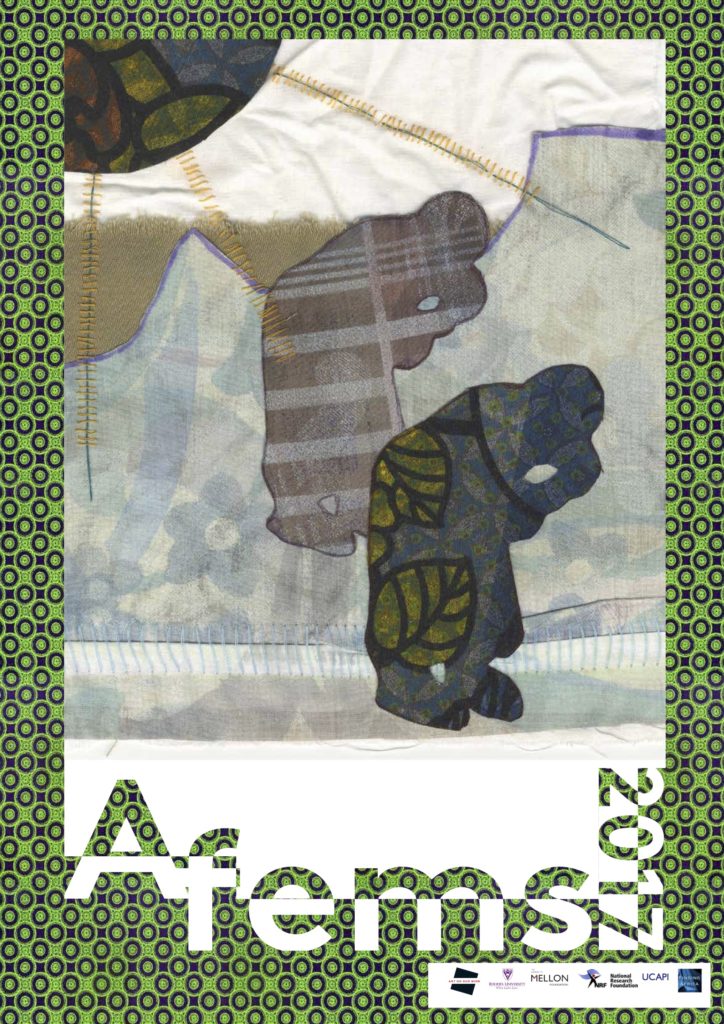
In Search of our Shrines: Feminist Healing and the Politics of Love
African Feminisms (Afems) Conference
University of Cape Town (GSB Conference Centre), 1-5 November 2021
The fourth edition of the African Feminisms (Afems) conference will be hosted as a hybrid physical and online event from 1st-5th November 2021 by the University of Cape Town (South Africa), in collaboration with the African Gender Institute, the Department of Literary Studies in English, Rhodes University and the Department of Fine Arts, Wits University.
The renewal of the soul follows a path that cannot be legislated for in parliament or studied at a prestigious university. It is a way of finding a spark that will trigger a loving and compassionate way of being with who we are, after being told that we are of no substance and value. (Mmatshilo Motsei)
The 2021 African Feminisms conference addresses alternative modes of knowledge production, ongoing implications of the divide between feminist theory and praxis, as well as intellectual and creative feminist strategies. What possibilities are offered by the multimodal, polyphonic, intersectional and deeply political work of feminist healing in societies that care little for women, queer and non-binary bodies and lives?
In a time of ecological collapse, neoliberal modes of governance that extend across institutions, the intensification and resurgence of racist and sexist public cultures, what are the possibilities for building worlds that are life-giving? How can practices of feminist healing ‘teach best what we most yearn for’ to bring about ‘revolutions of love and courage’ (Pregs Govender, 2007). What are the worlds yet to be built? What worlds, already in existence but not recognised by ‘deadened bureaucracies’ (Govender, 2007), can we build on and with for ‘renewal(s) of the soul’ (Motsei, 2007). Afems 2021 will include presentations from various scholarly disciplines and fields including paper presentations, conversations, themed convened panels, video-screenings, creative displays, book launches, as well as self- and group-care student workshops around:
FEATURED PANELS AND ROUNDTABLES
- The Pregs Govender Roundtable: with Pregs Govender in attendance
- Transnational Feminisms Panel: Transnational Feminist Currents On Healing, Care and Tides
- Environmental Feminisms Panel: Love in the Midst of Climate Change (film) and discussion
- Trans Feminisms Panel: Trans Identities in Africa
- Feminist Archives Reading Group: Reading Elaine Salo as an Act of Feminist Solidarities and Decolonial Healing
CREATIVE AND LITERAY PROGRAM
- Virtual Exhibition and Artist Discussion: Art on Our Mind Creative Dialogue with Sophie Peters, Nono Motlhoki and Sharlene Khan
- Virtual Exhibitions by Rehema Chachage, Kim Reynolds, Nono Motloki and Lebohang Mogul
- Poetry Readings by Malika Ndlovu, Sindiswa Busuku, Vangi Gantsho, Jaliya the Bird ith Malika Ndlovu, Sindiswa Busuku, Vangi Gantsho, Jaliya the Bird and Natalia Molebatsi
- Book Launch Discussions with Pumla Gqola, Gabeba Baderoon and Desirée Lewis, Barbara Boswell, Dina Ligaga, Tiffany Willoghby -Herard and Dee Marco
- Recorded Performance Pieces by Qondiswa James and Gertrude Fester
CAPE TOWN STUDENT WORKSHOPS
- Healing the Collective Feminist by Michelle Festus, Jude Clark, Busi Dlamini and Rikky Minyuku
- Re-Membering is Re-Writing (incl. poetry) by vangile ganthso & Malika Ndlovu
- Magick for healing – a quaternity of UWC’s feminist framily (incl film and word-sound-power) by Monique van Vuuren, Melandri Constant, Amy Brown and Xena Scullard
- Singing Our Souls – Regenerative Soundscapes That Call Us Home (music) by Injairu Kulundu
- Forgive, Forget and Move On (art) by Sophie Peters
- Kin by Danai Mupotsa
- Obstetric Violence: Breaking the Silence of Violence Against Women During Childbirth by Mmatshilo Mostei
Registration is free. Our workshops have limited capacity and a registration deadline of 22nd October 2021 (for catering purposes). There is no registration deadline for the virtual event.
VIRTUAL CONFERENCE REGISTRATION
https://uctcmc.eventsair.com/afems-2021/virtual-conference-registration
CAPE TOWN WORKSHOP REGISTRATION
https://uctcmc.eventsair.com/afems-2021/cape-town-workshop-registration
ENQUIRIES
Please direct all queries to: afems2020@gmail.com
CONFERENCE PROGRAMME
CONFERENCE ABSTRACTS
Keynote Speakers
Mmatshilo Motsei

Mmatshilo Motsei is an author, healer, spiritual health coach with a keen interest in integrating indigenous knowledge with modern innovation. She is the Founding Director of the Afrika Ikalafe Spiritual Health Institute. Aptly called Afrika Ikalafe, which means Afrika Heal Thyself, the aim of the Institute is to indigenise health and development and by so doing, build an African consciousness that will provide fertile ground for healing of wounded individuals, families, and communities. One of the key projects of Afrika Ikalafe is Marumo Fatshewhose focus is to use technology in a search for indigenous African healing justice framework in responding to sexual violence in South Africa.A Sociology Doctoral Student with an MA in Creative Writing and BA Hons Psychology, she started her career as a nurse, midwife, social science researcher, rural development facilitator and healer. She is a recipient of two honorary doctorates namely: University of Zululand (Community Psychology) and Nelson Mandela University (Faculty of Health). She has written and published several books. Her scholarly work includes teaching and facilitating seminars at UNISA, Wits, Stellenbosch, Mpumalanga, and Rhodes Universities. Using a combination of nursing, midwifery, physiology, psychology, creative writing and African spirituality, Mmatshilo Motsei perceives her work as a bridge for people to move beyond their smallness and limitations. Through years of facilitating workshops, seminars, and healing circles, she has learnt the art of igniting the genius in people. By grinding her own fears, she has also learnt to harvest the power within.
Websites: www.mmatshilomotsei.com and www.afrikaikalafe.org
Mmatshilo’s Motsei’s profile pic credit – Kamogelo Litheko
Tiffany Willougby-Herard

Tiffany Willoughby-Herard (Associate Professor of African American Studies, University of California, Irvine) is a Black political scientist who focuses on Black political thought and the material conditions of knowledge production, Black movements, South African historiography; blackness in international relations, diaspora, third world feminisms, decolonizing theory, feminist pedagogy, Black & African feminisms, and racial capitalism/gendered racisms/sexuality in international relations. Her current work explores cross-generational youth-led political organizing around land return, sexual violence, and colonial legacies in South Africa. She is concerned with political consciousness across generations and creative sites for political education. She is the author of Waste of a White Skin: The Carnegie Corporation and the Racial Logic of White Vulnerability (University of California Press 2015). Willoughby-Herard is also the co-editor of numerous journal special issues; a new book on Black feminist cultural studies in contemporary South Africa entitled Sasinda Futhi Siselapha: Black Feminist Approaches to Cultural Studies in South Africa’s Twenty-Five Years Since 1994 (Africa World Press 2020), and a textbook Theories of Blackness: On Life and Death (Cognella Press 2011). Willoughby-Herard is a founding member of the Transnational Black Womxn Scholars of African Politics Research Network; and a founding member of the Black Women and Gender Non-Binary research and creative writing group, #InForUs. As President of the 52 year old National Conference of Black Political Scientists Willoughby-Herard and a member of the LGBTQ+ Caucus and the Association for the Study of Black Women in Politics, she/they has found space to grow as a poet, an editor, a reader, a mama, a member of a church choir, a teacher, an undergraduate research supervisor, a friend, an ethical and grounded political scientist, and a Black internationalist lesbian feminist who survived.
Peace Kiguwa

Peace Kiguwa (PhD) is Associate Professor in Psychology at the School of Human and Community Development, the University of the Witwatersrand, South Africa. Her research interests include critical social psychology, affective politics of gender and sexuality, racism and racialization and the nuances of teaching and learning. Her research projects include focus on young women’s leadership in Higher Education in partnership with the African Gender Institute (AGI) and the Destabilizing Heteronormativity project in partnership with Aids International (AAI). She has co-edited three books (UCT and ZED press releases) and has published in both local and internationally accredited journals. She is currently Editorial Board member on three accredited journals and has co-edited three Special Issue journals: Rethinking Social Cohesion and its relationship to Exclusion, Papers on Social Representations and Micro-politics of Belonging in Higher Education. She is the current Chair of the Sexuality and Gender Division of the Psychology Society of South Africa (PSYSSA) and recent recipient of the Oppenheimer Memorial Trust Rising Star Fellowship at Wits University.
Featured Guest
Pregs Govender

Pregs Govender is a writer, educator, and author. Pregs was active in the student, teacher, women and trade union movements that fought Apartheid in the late 70’s and 80’s. During South Africa’s transition, she managed the Women’s National Coalition campaign for equality and women’s rights in the Constitution and future SA. As an ANC MP from 1994, she proposed that SA develop the ‘Women’s Budget’ and steered its political mpact on the 1998/1999 National Budget. She chaired Parliament’s committee on women, that ensured Parliament enacted over 80% of women’s legislative demands. In 2002, she resigned after being the only MP across parties to register opposition to the arms deal in the defence budget vote and after chairing HIV/AIDS public hearings (breaking the silence of the ANC Caucus on treatment). In 2009, Parliament unanimously elected her to the South African Human Rights Commission which she served as Deputy Chair until 2015, where her feminist approach advanced socio economic rights especially on water and sanitation in SA and globally. Pregs is the author of Love and Courage, A Story of Insubordination which has been used as a toolkit, guide and curriculum resource by individuals, organisations and movements, including feminist activists, teachers, writers, trade unionists, and parliamentarians. It is used to teach anti-racist and anti-capitalist feminism, writing political memoir, personal and political transformation, budgets, economics and law-making, political transitions and women’s coalitions, meditation & activism. Pregs currently holds a Sonke Gender Justice Fellowship to establish an Institute for Transformative Feminist Leadership.
Website: www.pregsgovender.com
Pregs Govender bio and profile pic courtesy of Gcina Mhlope
Featured Artist
Sophie Peters

Born June 23, 1968 in Johannesburg before moving to Cape Town, Sophie Peters has taught in a variety of places and organizations including the Child Welfare Society, the People’s Centre in Nyanga East, the Sakhile Children’s Art Project in Mitchells Plain, the Visual Arts Group at Luyolo Community Centre in Gugulethu as well as numerous projects and workshops for children and adults. Anartist in her own right, Sophie has produced work in various mediums from linocuts to cast iron sculpture to oil paintings. Peters has exhibited both nationally and internationally and in recent years her works has been featured in several major South African exhibitions including “Peace for South Africa” in Switzerland ( 1995), “Woman on South Africa” (1995) in the Paarl Museum and ‘South African Artist” (1990) in London just to name a few. When asked about her artistic influences she replied, “My work is an expression of myself. I am not really influenced by any one artist but only by my own particular experiences”.An avid muralist, Sophie Peters has contributed her skills back to the community many times over including several in the Cape Town area as well as four murals in London co-designed with other participating South Africa artist for the Zabalaza festival in 1990. Her work has been extensively featured South African magazines and collected by the South African National Gallery.
Featured Film
Love in the Midst of Climate Change
The Midst Of Climate Change is a documentary that highlights ordinary people doing extraordinary things to survive and lead decent lives in the teeth of adverse circumstances. It chronicles the work of climate change activists in Cape Town, SA and Newark, New Jersey as they work to bring the reality of climate change home to the people who are most affected. We believe that only as a mass movement can we effect change, so the mission of this film is to reach as many as possible. Thanks to the contributions of many (not least AFEM 2018), we raised enough money to complete a 20 minute short which screened in the US, Morocco and Finland. We continue to seek funding to complete the full project, Please donate!
Crowdfunding link: http://www.commonmindsmedia.com/








